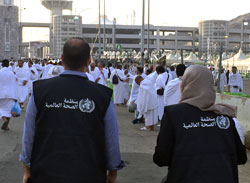Archive for September, 2016
FBI: A backpack containing 5 IEDs was found in a wastebasket in Elizabeth, New Jersey, outside a neighborhood pub and located about 500 feet from a train trestle.
Monday, September 19th, 2016The bomb detonated on Saturday in New York, and another device found nearby, were both shrapnel-filled pressure cookers – similar to the bombs used at the 2013 Boston Marathon.
Monday, September 19th, 2016At least 13 people were killed Sunday when a double-decker passenger boat carrying more than 100 people capsized in a river north of Bangkok, Thailand
Sunday, September 18th, 2016The stabbing of 9 people at a Minnesota mall Saturday: Was the “perp” a “soldier of the Islamic state?”
Sunday, September 18th, 2016A day after a bombing injured 29 people in a Manhattan neighborhood, was it personal, was it political?
Sunday, September 18th, 2016More than a thousand migrants, including Syrians, Afghans, Pakistanis and Iraqis, arrived in Greece last week.
Thursday, September 15th, 2016A team of Japanese researchers say that they have found a statistical correlation between periods of excessive tidal forces and large earthquakes.
Thursday, September 15th, 2016“….In all, nine of the 12 biggest quakes on record happened near new or full moons, a number that appears to exceed chance. This included the 2004 Indonesian earthquake and ensuing tidal wave, and the 2011 earthquake in Japan that caused the Fukushima nuclear disaster….The mechanism by which this happens is still unclear, however……..”
An explosion on a ferry carrying 35 tourists between the Indonesian resort islands of Bali and Lombok on Thursday has reportedly killed two and injured 13.
Thursday, September 15th, 2016“…It was not clear what caused the explosion in the speedboat but police said they did not think it was caused by a bomb….”

No major public health event reported during the pilgrimage: WHO concludes its mission to Saudi Arabia .
Thursday, September 15th, 201614 September 2016, Mecca – The World Health Organization (WHO) has today concluded its mission to Saudi Arabia to support the Ministry of Health in ensuring a safe pilgrimage season (Hajj). So far there has been no major health threat or event of concern, with no major disease outbreak reported among the nearly two million pilgrims attending the holy sites.
In preparation for the Hajj, the Ministry of Health, together with WHO, conducted a strategic health risk assessment of the health hazards that might occur during the pilgrimage. Based on the requirements of the International Health Regulations (2005), the Ministry put in place several public health mitigation measures covering areas such as infection prevention and control, points of entry, laboratories, coordination, risk communication and community engagement. Additionally many measures have been put in place to reduce the effects of high temperatures on pilgrims, including awareness campaigns on preventing sun strokes and heat exhaustion.

Preliminary information indicates a decrease in morbidity and mortality from seasonal influenza compared to last year. This might be related to the Ministry of Health’s decision to make seasonal influenza vaccine compulsory for all internal pilgrims. Some countries also vaccinated their pilgrims against seasonal influenza in accordance with Saudi Arabia’s health requirements for the Hajj.
No cases of Middle East respiratory syndrome coronavirus (MERS-CoV) have been reported so far among the pilgrims. Of 344 samples collected and tested by the national public health laboratory, none was found to be positive for MERS-CoV.
WHO has shared the conclusions and recommendations of the mission with the Ministry of Health, noting the importance of documenting and sharing experiences and good practices for improving public health preparedness for future Hajj seasons.
For more information:
Rana Sidani, Senior Communication Officer
Mobile: +20 1099756506
E-mail: sidanir@who.int This e-mail address is being protected from spambots. You need JavaScript enabled to view it
Mona Yassin, Communication Officer
Mobile: +20 1006019284
E-mail: yassinm@who.int







